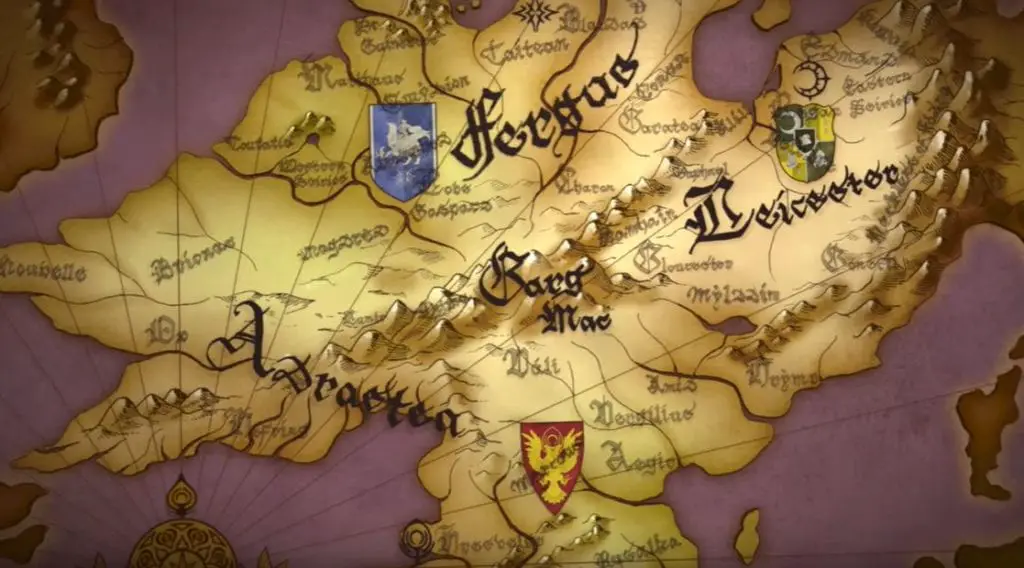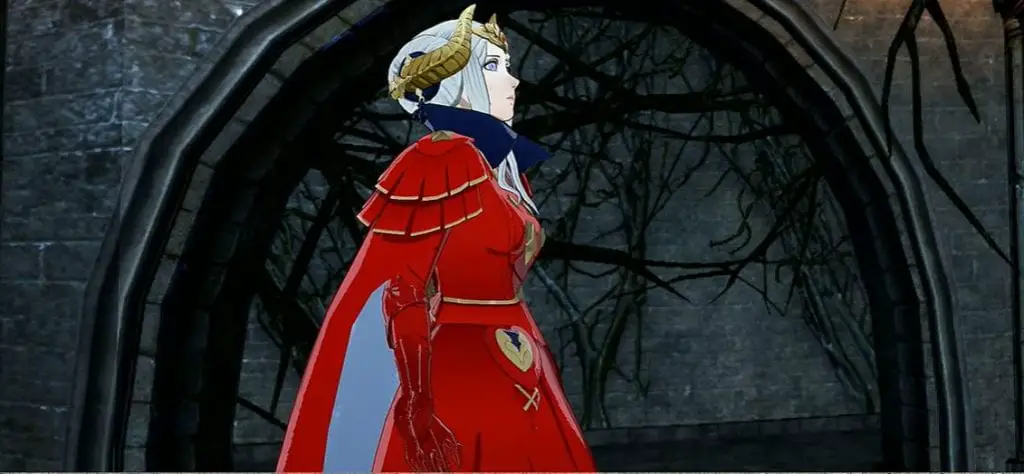The crux of the story in Fire Emblem: Three Houses is the conflict between Rhea, archbishop of the Church of Seiros, and Edelgard, Emperor-in-waiting of the once continental empire of Adrestia. The story’s second half begins when Edelgard forcefully ascends her throne and declares open war on the Church. No matter what route you play, it’s a hard war to fight, full of tough moments and divided loyalties between characters who have known each other since childhood. it’s the most morally gray story of any Fire Emblem game because it forces the player to put down so many characters that they grew to like in the story’s first half.
But let’s get one thing right about the conflict at the heart of it. Edelgard is right. No matter what route you play, Edelgard is right.
This won’t surprise anyone who has visited this site for a long time and knows our affinity for dutiful princesses. Edelgard certainly fits the bill, with her ingrained sense of authority and horrible communication skills. I will always gravitate towards these characters. Still, she’s right. If anyone is right in this story, Edelgard is right.

At the core of her motivation is a hatred for the inequality and oppression of the world they live in, born of the power of Crests, the impact they have on Three House’s feudal nobility, and the role the Church played in creating it. She experienced the horror of this firsthand. She underwent horrific experiments meant to bestow Crest powers on her and her siblings, and she was the only one of ten children to survive the process both physically and mentally. From the beginning, she was caught up in the tragedies born of the power the world was based around.
Crests are basically birthright powers originating from the “goddess” Sothis and her children, who used their blood to bestow the powers of a Crest upon Ten Elites. Sothis and her children are actually Nabateans, a race of immortal dragons that have controlled humanity for basically all the history we hear of. The Church of Seiros is run by Sothis’s daughter, Rhea, who is actually Seiros.
Just knowing this, it’s easy to fully understand why Edelgard holds such determination to overthrow Rhea and the Church and why she may be very much right to do so. The Church is run by the very creatures responsible for Crests. Crests, and the desperation of modern society to use their power for their own benefit, are the reason she underwent a trauma that killed her siblings and left her forever changed. Maybe if she didn’t know then it would be less excusable, but it’s knowledge passed down by her family with each new emperor.
Even if you take her own personal grudges out of it, she’s still right. Rhea continuously proves the selfish desire at her heart and her ambition to always rule over humanity. Byleth only exists because of Rhea’s continued attempts to resurrect her mother, Sothis. The first half of the game sees her wielding the Church’s power by crushing any who oppose them.
Presumably, she’s intending to stop the evil forces who were responsible for experimenting on Edelgard and want the power of Crests for themselves, but there are innocent people ruthlessly crushed if they don’t fall completely in line with Rhea and the Church. You can see their hand directly involved in the splitting of Fodlan into three separate nations throughout history, which can easily be interpreted as a way to keep humanity from uniting and rebelling. The Church fosters division within humanity to protect the dragons who rule it.
This has led to an absolutely terrible political system where nobles buy and sell each other to acquire more Crest power and show complete subservience to a corrupt church. It’s your usual fantasy analog for the pure bloodlines of nobles. Everyone’s in a constantly violent struggle to belong.
Edelgard’s motivations always fall back on two ideas; the liberation of humanity from the control of these dragons, and eliminating the inequality of the noble system and Crests. In comparison, Rhea’s motivations are always selfish. Even the main character’s existence is her selfish meddling in the lives of humans. She causes suffering for everyone else in hopes of ending her own.
No matter which scenario you play through, Edelgard only reinforces the desire to liberate humanity and Rhea only reinforces her selfishness.
I picked Black Eagle as my first House, and sided with Edelgard against Rhea. I was not surprised when Edelgard was presented as a flawed but very much sympathetic person with justifiable motivations. When Rhea went completely off the rails, that didn’t surprise me either. Typically when games do multiple scenarios, that’s how it works. The side you choose is the more rational, sympathetic one, while the side you didn’t choose becomes evil. I figured things would flip when I sided with Rhea over Edelgard.
Only that’s not at all what happened.
No matter which path you take, Edelgard never presents herself as anything besides a person dedicated to ending the injustices which killed her family. Her worst downfalls come in the Blue Lions playthrough, where she transforms herself into a monster in a last-ditch effort to avoid defeat, and she still voices the motivation to end the suffering inflicted on her in her childhood. She always voices regret that her path has failed, but hopes and trusts that Byleth will make the best of it.
Compare this to Rhea or Dimitri, who act out of personal interest. Dimitri acts purely out of a bloodlust for revenge against Edelgard. There’s no greater motivation or ethos to their actions besides power and revenge.
When you side with Edelgard, there is no doubting the sheer villainy of those two. They descend into brutal anger and hostility. They side with evil forces. There’s no real sympathetic view of them unless you already played their paths and have an emotional investment in their characters. Without that, they come across as angry villains.
Rhea, especially, is painted as rather terrible no matter what you do, because nothing changes whether you side with her or not. She’s ultimately an immortal being controlling the world who can’t let go of the past and takes it out on everyone else. She has manipulated and murdered and controlled humanity for thousands of years.
Meanwhile, Edelgard is still sympathetic in words and actions in any path. The only other character to manage that is Claude, but mainly only because he’s detached from the conflict in every path except his own.

To be clear, I’m not going to defend Edelgard’s actions. Whatever her motivations, she does start a brutal war lasting half a decade that murders thousands and results in tragedy no matter who wins. She sides with the very faction that experimented on her, which does undercut her desire to prevent anyone else from experiencing her trauma. Yes, she intends to eliminate them once she no longer needs them, and if you side with Edelgard they work as much against her as for her, but who knows what power she unintentionally hands them beforehand.
She is also far too impatient and extreme. There’s nothing particularly stopping her from fostering her relationships with her fellow students at Garreg Mach, who are almost all poised to assume leadership roles throughout Fodlan. She could have taken time to convince them of injustices the Church perpetrates. Edelgard could even have enlisted them to help her eliminate Those Who Slither in the Dark. Maybe from there, she would have an easier time convincing them of the crimes committed in the name of Crests.
In the end, though, everyone’s actions are questionable and can be criticized. Edelgard is the only one who wants to spur a change that Fodlan desperately needs. Her movement is an obvious analog for any story of ending the injustice of your stereotypical medieval society. This is usually the point of any fantasy story set in medieval society. Change is necessary because feudal society is unsustainable. Changing power from the hands of a few to the hands of the many is inevitably bloody and hard-earned. Edelgard has no qualms over the necessity of this violence.
You can certainly criticize it, and I have. No matter how I look at it, though, I can’t help but come to the conclusion that Edelgard is on the right side of this conflict.
Many of the characters in Three Houses have some trauma or unjust experience related to Crests. Bernadetta’s father abused her. Dorothea was once homeless because she lacked noble blood. Lysithea underwent the same experiments Edelgard did. Petra is a political hostage to keep a foreign nation in line, sent to the Adrestians in the aftermath of a war. Suffering because of Crests and the Church can be found everywhere.
Fire Emblem: Three Houses ultimately boils down to a conflict between one human who wants to fight the unsustainable injustices of the world and the creature responsible for both the creation and spread of those injustices.
When looked at in this light, how in the world could anyone besides Edelgard be right?

